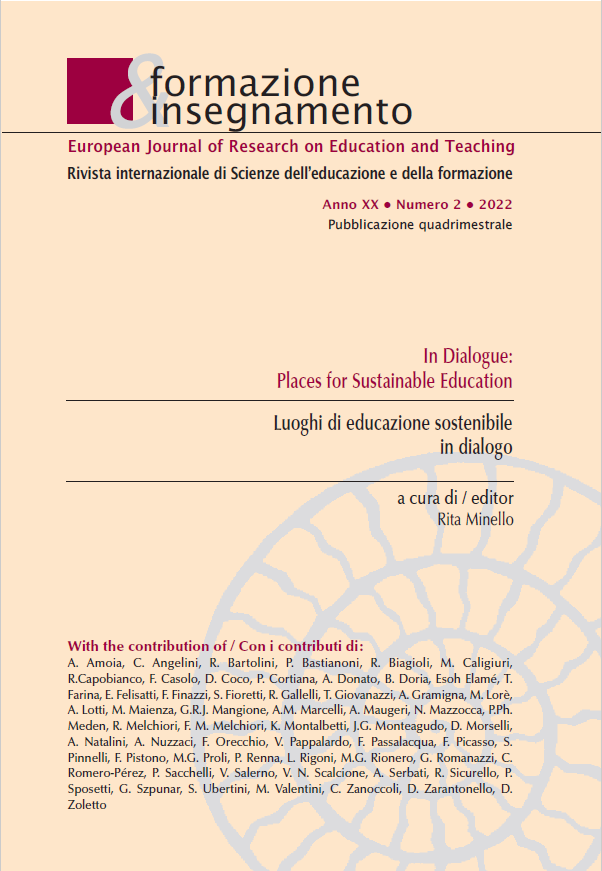Le scuole Waldorf: metodi e piano di studi esaminati alla luce di una rilettura critica del testo steineriano
DOI:
https://doi.org/10.7346/-fei-XX-02-22_33Parole chiave:
Scuole Waldorf, Insegnamento per epoche, Metodi di insegnamento, Piano di studi, Educazione prescolareAbstract
Un elemento differenziatore della scuola Waldorf rispetto a quella tradizionale è rappresentato dalla particolare articolazione temporale della giornata scolastica e dai tempi di insegnamento delle varie materie nell'arco dell'anno. Se tale tipo di scuola si caratterizza per l'accentuata flessibilità dell'organizzazione didattica, si deve anche tenere conto degli adeguamenti che il sistema legislativo del Paese nel quale la scuola è inserita impone alla sua organizzazione effettiva. Il presente articolo si è proposto, oltre che di mettere in luce tali aspetti, di offrire, attraverso una rilettura critica del testo steineriano, una interpretazione dei principi pedagogici più importanti posti alla base delle modalità di organizzazione della didattica nella scuola Waldorf, di individuare i metodi suggeriti al docente per l'insegnamento delle varie materie di studio in relazione all'età dei discenti, di sottolineare quelli che dovrebbero essere i compiti, nell'ottica steineriana, affidati all'educazione prescolare e della scuola dell'obbligo per realizzare una corretta istruzione, e di mostrare le peculiarità che possono riconoscersi all'insegnamento della scrittura e della lettura così come concepito dal pedagogista austriaco. Il lavoro si conclude con alcune considerazioni sulla validità del sistema complessivo preso in esame.
Riferimenti bibliografici
Armenise, G. (2006). Rudolf Steiner: educazione e sviluppo della creatività, in Cavallera, H. A. e altri, Rudolf Steiner tra antroposofia ed educazione. Atti del convegno internazionale tenuto a Manduria il 6 ottobre 2004. Lecce: Pensa Multimedia.
Chistolini, S. (2018). La formazione degli insegnanti alla pedagogia Waldorf. Biografia della Scuola Rudolf Steiner di Roma. Milano: Angeli.
Heydebrand, C. (2009). Il piano di studi della libera scuola Waldorf. Milano: Filadelfia Editore.
Steiner, R. (2006). Cultura, politica, economia. Verso una triarticolazione dell'organismo sociale. Monaco: Archiati Verlag.
Steiner, R. (2009). Arte dell'educazione. I-Antropologia. Milano: Antroposofica.
Steiner, R. (2012a). Arte dell'educazione. II-Didattica. Milano: Antroposofica.
Steiner, R. (2012b). Arte dell'educazione. III-Conversazioni di tirocinio e conferenze sul piano di studi. Milano: Antroposofica.
Steiner, R. (2015a). La prassi pedagogica dal punto di vista della conoscenza scientifico spirituale dell'essere umano. L'educazione del bambino e del ragazzo. Milano: Antroposofica.
Steiner, R. (2015b). Il sano sviluppo dell'essere umano. Una introduzione alla pedagogia e alla didattica della Scuola Waldorf – vol. I. Milano: Antroposofica.
Steiner, R. (2016a). Il sano sviluppo dell'essere umano. Una introduzione alla pedagogia e alla didattica della Scuola Waldorf – vol. II. Milano: Antroposofica.
Steiner, R. (2016b). Dallo Stato unico all'Organismo sociale triarticolato. Milano: Antroposofica.
Steiner, R. (2016c). Educazione del bambino e preparazione degli educatori. Milano: Antroposofica.
Steiner, R. (2017). Introduzione all'antroposofia. Milano: Antroposofica.
Ullrich, H. (2013). Rudolf Steiner. Roma: Carocci.
Wiechert, C. (2015). La scuola steineriana. Un'introduzione. Milano: Edizioni Arcobaleno.
##submission.downloads##
Pubblicato
Come citare
Fascicolo
Sezione
Licenza
Copyright (c) 2022 Fausto Finazzi

TQuesto lavoro è fornito con la licenza Creative Commons Attribuzione 4.0 Internazionale.
Formazione & insegnamento è distribuita con la seguente licenza: Attribution 4.0 International (CC BY 4.0).
Per ulteriori dettagli, si rimanda alle Politiche di archiviazione e ai Termini di Copyright e Licenza.





